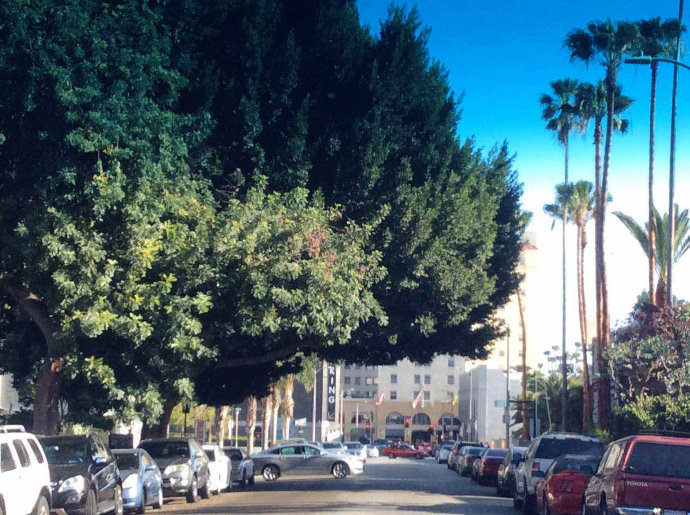(单词翻译:单击)
听力文本
This is Scientific American — 60-Second Science. I'm Christopher Intagliata.
When California was strangled by drought, the city of Los Angeles was offering homeowners cash to replace their lawns with landscaping that was less thirsty. Because water just evaporates from overwatered lawns. But how much?
"So that turned out to be a lot of water." Diane Pataki, an ecologist at the University of Utah. "It turned out to be 70 billion gallons of water a year."
Pataki and her team got that number using a combination of real-world sensor data and modeling. And they found that, of water wasted specifically in urban landscaping, lawns were to blame for three quarters of it, with L.A.'s six million trees accounting for the rest.
The study also uncovered something these ecologists were not expecting to study: economic disparity. "The amount of vegetation is really closely related to affluence. So in L.A. that means wealthy neighborhoods actually have twice the evapotranspiration of poorer neighborhoods." Meaning low income neighborhoods not only miss out on that greenery: but also the natural, built-in cooling effect of evapotranspiration. The findings are in the journal Water Resources Research.

Finally: if you think native trees are the solution to water waste? Think again, Pataki says. "Some of the highest water users in L.A. are those species, including the native California sycamore, which is a very, very popular tree." The reason being that southern California doesn't have a lot of native trees, except alongside rivers—meaning they're water guzzlers by nature.
Better, she says, to plant other species that thrive in Mediterranean climates, like water-thrifty pines and palms. Because even if the drought comes back, she says, L.A.'s secret to stay in green may be its trees. "It doesn't take a lot of water in terms of absolute gallons to keep them alive. So moving forward L.A. could be very water efficient and maintain a very extensive tree canopy, which I think is good news."
Thanks for listening for Scientific American — 60-Second Science Science. I'm Christopher Intagliata.
参考译文
这里是科学美国人——60秒科学。我是克里斯托弗·因塔利亚塔。
当加州饱受干旱困扰时,洛杉矶则在给房屋业主提供现金,让他们将草坪换成用水量较少的园林绿化。因为水分会从过度灌溉的草坪上蒸发掉。但到底会蒸发掉多少呢?
“那其实是非常多的水量。”犹他大学的生态学家黛安·帕塔基说道,“结果是每年会蒸发掉700亿加仑的水。”
帕塔基和团队将真实世界的传感器数据和建模相结合,获得了这一数字。他们发现,城市绿化所浪费的水中,有四分之三用来灌溉草坪,而余下的水量则用来浇灌洛杉矶的600万棵树。
该研究还揭示了这些生态学家未打算研究的问题:经济差异。“植被数量确实与富裕程度密切相关。这表明,洛杉矶富人区的水分蒸散量是较贫困社区的两倍。”即低收入社区不仅缺少绿色植物,还错失了植被天然的、自带制冷效果的蒸发蒸腾作用。这项研究发表在《水资源研究》期刊上。
研究最后表示:如果你认为原生树木是水资源浪费的解决方案,那帕塔基会请你三思。“在洛杉矶,耗水最最大的就是那些树木,其中包括极受欢迎的加州本土梧桐。”形成这种现象的原因是,除了傍水而生的树木,南加州并没有太多原生树木,这意味着它们天生嗜水。
她表示,最好种植那些喜爱地中海气候的植物,比如节水的松树和棕榈树。她说,因为即使干旱再度来袭,洛杉矶保持绿化的秘诀可能就是这些树木了。“它们维持生存不需要太多水。因此长远来看,洛杉矶可能发展成水资源利用率很高、树木覆盖率极广的城市,我认为这是一个好消息。”
谢谢大家收听科学美国人——60秒科学。我是克里斯托弗·因塔利亚塔。
译文为可可英语翻译,未经授权请勿转载!
重点讲解
重点讲解:
1. miss out on 没有参加,错过(对自己有益或有趣的事);
例句:We're missing out on a tremendous opportunity.
我们在坐失良机。
2. think again 重新考虑,再三斟酌(常指最终改变主意);
例句:He intends to ask the court to think again.
他打算请求法庭再重新审度。
3. even if 即使;尽管;纵然;
例句:Even if you laughed at me, I wouldn't give up.
即使你嘲笑我,我也不放弃。
4. in terms of 在…方面;从…角度看;根据…来说;
例句:If one has not formed the reading habit, he is confined to his small world around him in terms of time and space.
那个没有养成读书习惯的人,以时间和空间而言,是受着他眼前的世界所禁锢的。


